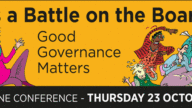The importance of reporting to your Board
The Board/Executive relationship is crucial to the success of your charity.
I’m going to share very important advice with those of you who are CEOs. Based on decades of experience. And lots of recent horror stories.
Please take it seriously because it will protect your trustees in the event of an investigation or inquiry by the Charity Commission.
And it could also save your job.
- You need to remind your trustees that you report to the whole board not the Chair. The Chair facilitates the relationship between you and the board but the Chair is NOT your boss – the board is.
- This means you must LITERALLY report to the whole board. And that means that you don’t treat the chair as the gatekeeper of who is allowed to know what. The Board has a duty in law to be kept fully informed of anything that affects the charity and its work. So when you are sending information or updates send it to the WHOLE board.
- By all means, discuss with the Chair the best mechanism for sharing information – but many Chairs forget that they have a duty to ensure the board knows everything they do so be clear that your duty as the CEO is to ensure that the whole board knows what is going on in the charity.
- Never have your appraisal just with the Chair. Make sure there is at least one other trustee present and also that all trustees have had the chance to comment on your performance and you have seen what they have said. Good and bad.
- Share your appraisal write up with the whole board.
- Make the time to meet with every single one of your trustees at least once a year, so that they get to know you outside of what the Chair tells them or at meetings.
- And remember that helping to ensure your board is governing well is a very important part of your job. It’s not a side gig. You are there to support, advise, guide and protect them as well as deliver the work of the charity in line with their decisions.
A very dear and extremely experienced CEO friend of mine remarked that no matter how good your relationship is with your Chair, during times of change or crisis it’s not safe, for either you or the board, to rely on the Chair alone.
And always, always make sure you are familiar with the guidance on the website of your regulator, the Charity Commission of whichever nation you are in. It is really, really helpful!
Join the Conversation at It’s a Battle on the Board – Why Good Governance Matters Conference
If this blog resonated with you, don’t miss DSC’s upcoming online conference, It’s a Battle on the Board – Good Governance Matters, taking place on Thursday 23 October, where Debra will be chatting about how to work effectively with your Executive.
Whether you’re a trustee, CEO, or part of a leadership team, this event dives deep into the very challenges explored here, from unspoken conflict and fractured trust to building a culture of openness and alignment. You’ll gain practical tools, real-life insights, and the chance to learn from others who’ve faced similar governance battles and come out stronger.
Because good governance isn’t just about policies and procedures, it’s about people, relationships, and having the courage to face the hard stuff together.
Book your place now and be part of the change.

